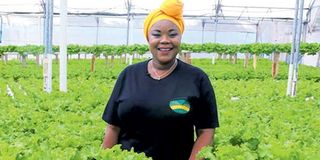Lady who grows money in pipes

Mwamvua Mlangwa
What you need to know:
Having been employed for about 18 years, Mwamvua Mlangwa thought it would be wise to step out of her comfort zone and prepare for retirement well in advance.
Her decision to leave formal employment two years ago was one that very few are bold enough to make.
Having been employed for about 18 years, Mwamvua Mlangwa thought it would be wise to step out of her comfort zone and prepare for retirement well in advance.
She needed that independence and the ability to stand on her own feet rather than depend on month-end pay. Being self-employed would give her enough time to be with her family. Mwamvua knew what she wanted to do before she made the decision to quit her job at the National Microfinance Bank, where she had worked for about a year and a half as a bank cooperative affairs coordinator. She previously worked with Vodacom for over 15 years in different positions.
She wanted to venture into agribusiness and invested in the project using the money she had saved all this while.
“I can say farming is in my blood. When growing up, I used to enjoy helping my parents on our farms in Kibaha, Ruvu and Chanika. This is what I wanted to do and I wanted to do it in a modern way,” says the mother of two.
With a diploma in marketing and business administration plus training in hydroponic farming, Mwamvua was ready to follow her dream. Today she is the proud owner and founder of Mwammy Green Veggies company, which supplies fresh vegetables in Dar es Salaam straight from the farm.
The technology she uses in her farming does not involve growing plants in soil but in plastic pipes filled with water containing mineral nutrients. Hydroponic farming, according to Wikipedia is a method of growing plants without soil, using mineral nutrient solutions in a water solvent. Terrestrial plants may be grown with only their roots exposed to the mineral solution, or the roots may be supported by an inert medium, such as perlite or gravel.
The technology that provides better yields in a short time and on a small area is practised in Israel, which is where Mwamvua borrowed it. She learnt this during one of her numerous trips to the country. Because she cannot find the exact type of plastic used in Israel, she buys plastic pipes used in construction in which she grows her vegetables.
“My visit to Israel inspired me a lot. Israel is a small country and half of it is almost a desert but they use advanced technology in horticulture. I was very much interested in this and thought I could do the same back home,” she says.
Having stayed in the country for six months, it was easy for her to learn the farming technology since she could speak Hebrew.
Mwamvua’s day starts at 5.30 am. She goes through the day’s orders from customers before she together with her workers go out to the farm to pick the vegs. She grows lettuce and spices like coriander in green houses in her compound.
Her big greenhouse vegetable farm is just a few metres from her house. A small door leads to the greenhouse where one is greeted by a beautiful sight of the healthy-looking green vegetables. On entering the greenhouse, I mistook the lettuce for Chinese spinach.
Mwamvua does not regret venturing into agribusiness because apart from enjoying what she does she earns a good income from it. Her customers are big hotels and supermakets in the city.
Mwamvua says her parent’s type of farming depended on the rains and fertiliser use and was not as profitable. With hydroponic farming, chances of getting a good yield plus profit is very high. She puts it at 98 per cent.
“I use greenhouse because it has tents which prevent insects from destroying the plants. The good thing about hydroponic farming is that apart from the fact that inputs like manure and preparing a new farm for the subsequent season are not required, it also saves one from the trouble of weeding,” she says.
Apart from the investment cost, which is high, Mwamvua says this kind of agriculture is good and cheap in the long run.
“Investment cost is high because the technology requires use of special plastic pipes which are not available here. The plastic materials that we use alternatively are costly because they are meant for construction and not agriculture.
“I reshape and resize the plastic pipes to enable the growth of lettuce or any other vegetables. The pipes are very expensive, so is the greenhouse,” she says. A greenhouse costs between Sh6 million and Sh12 million depending on the size.
Another challenge in this kind of agriculture is power. Apart from the high bill, power interruptions mean incurring extra costs since one has to use a power generator. Power is needed for the fans that cool the air in the greenhouses given Dar’s heat. Power is also needed to pump water into the tanks and for lighting.
Challenges aside, Mwamvua says the business is good generally. She plans to expand her farm in a bigger area where she would also offer practical training on the use of the technology.
She advises youth to invest in agriculture saying they can start small and expand with time. She urges the government to protect local farmers by discouraging imports. She also requests government to boost the sector by allocating enough funds.
Government should also help reduce the greenhouse cost by setting up a green house manufacturing factory and sell them at reasonable prices. A factory manufacturing the pipes needed in hydroponics farming would also do.
Email: [email protected]




